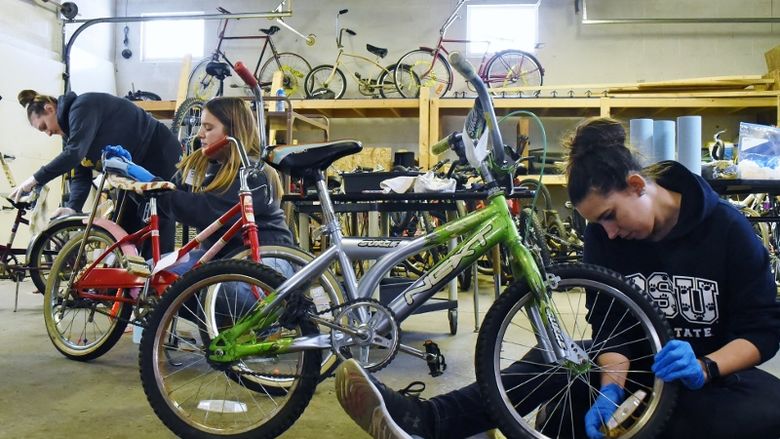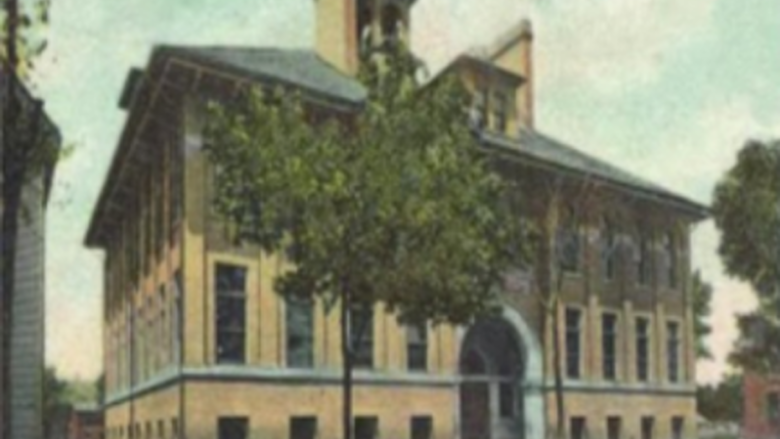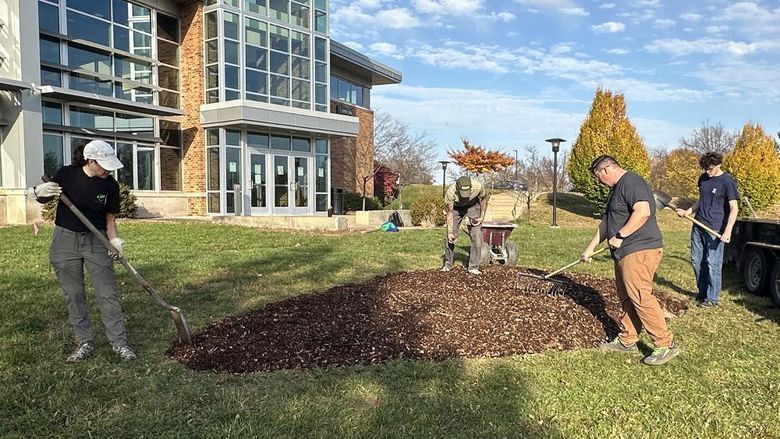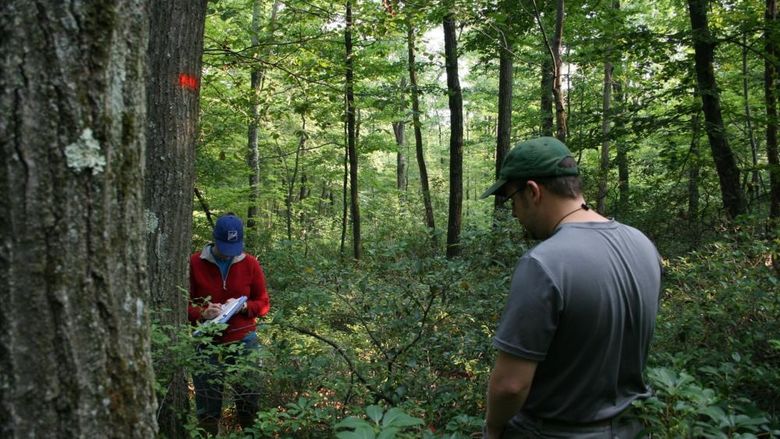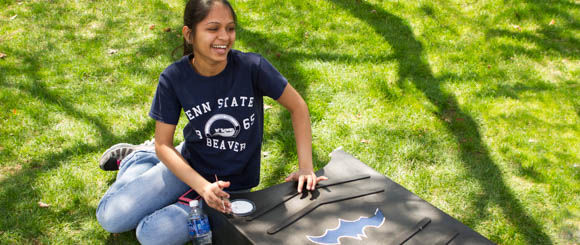
Ruhi Patel paints a bat house as part of a service learning project for her biology class. The bat house was later hung on the Beaver campus.
Natalie Pollack takes 21 credits a semester at Penn State Beaver. She works 30 hours a week, as a direct care aid at Heart 2 Heart home care and as a service representative at the YMCA. Then, she has to study and see her family and her boyfriend.
But, somehow, she still finds time for Lallah.
Lallah is Natalie’s 8-year-old “little sister.” The pair was matched through the Big Brothers, Big Sisters program, and though Pollack did, and still does, volunteer of her own accord, last fall it also helped her pass Introduction to Philosophy.
Each semester, Senior Philosophy Instructor Irene Wolf offers her students the same deal: you give the community 21 hours of service and write a reflection paper on what you’ve experienced and she’ll let you out of a test. She gets a lot of takers; some because they are already civic minded and some because they’d rather not have their academic fate decided by a set of multiple choice questions. To Wolf, it doesn’t matter why. She cares only that students are connecting classroom curriculum with community needs and developing a sense of social responsibility.
“It’s a way to change students’ way of thinking,” Wolf said. “If you change their thinking, their way of being, you’ll change their life.”
That was the outcome Senior Sociology Instructor JoAnn Chirico had in mind when she started pushing for service learning opportunities. When Chirico began working at the Beaver campus in 1997, service learning was in its infancy here. No one seemed to be offering it or even talking much about it.
So Chirico, who had taught service learning since the 1980s at other institutions, applied for, and received, grants from Penn State and the State Community Development Program to launch a campus initiative called Reach Out.
Reach Out connects Penn State Beaver students with service projects designed to meet the needs of the community. The cornerstone of the program is an open house where students meet the community-based organizations that could use their help.
Today, Reach Out isn’t the only way to get involved and Wolf’s class isn’t the only one focused on service learning. The campus offers a civic and community engagement minor and many individual classes take on service learning projects. In the past year, Cassandra Miller-Butterworth’s biology students built bat houses for the campus, Jim Hendrickson’s engineering students created a water-aiming device for a rural fire department, Amber McConahy’s information science and technology students developed a historic walking tour app for the Shenango campus and John Chapin’s communications students recorded a therapy dog video that is currently featured on the American Kennel Club website. And that’s just a sampling.
Taken together, Beaver students give what amounts to more than $20,000 in economic value to the community each year.
“Sociology started to try to make a better world,” Chirico said. “This is how you can do it.”
Helper’s high
Of course, the community isn’t the only beneficiary of service.
The volunteer gets something out of it, too.
Take Pollack, for example. Lallah’s mother noticed that the more time her daughter spent with Pollack – going on Brady's Run nature walks, eating ice cream, painting nails, finishing homework, ice skating – the more the 8-year-old’s attitude and school work improved.
Pollack, a sophomore administration of justice major, saw similar benefits for herself. She became more appreciative of what she had and more aware of the way she managed her time and studies.
“College kids can take everything for granted,” Pollack said. “Seeing the other side of things really changes the way you think.”
Wolf calls it the helper’s high.
Chirico calls it getting to know your looking glass self.
“If you see how valuable you are to other people, you recognize more of your own value,” she said. “There’s tremendous personal reward.”
Studies show that service has a variety of personal benefits, such as helping to lessen depression and anxiety – common amongst college students – by providing the volunteer with a sense of purpose and a new social network. But there are more pragmatic benefits, too. Volunteering teaches new skills, offers real-life experience and allows students to test drive career paths.
“I couldn’t decide what area of psychology I wanted to go into,” said junior psychology major Heather Bryant. “Volunteering was a good way to help figure it out.”
Bryant was introduced to the Salvation Army’s after school program during one of Chirico’s open houses. Bryant hadn’t planned to volunteer with children, but the program representative spoke with such passion that she immediately signed on for a semester of tutoring the youngest students.
“Before I was sure I didn’t want to work with kids,” Bryant said, “now I’d consider it.”
Helper’s low
Chirico estimates that 95 percent of students who have volunteered through Reach Out or as part of their classes have had a positive experience.
Junior psychology major Tara Kubik was part of the other 5 percent.
When she was in elementary school, Kubik’s greatest wish was to own an animal shelter. She collected goods for the Beaver County Humane Society. She adopted a black Lab from the organization. So when it came time to pick a service learning opportunity as part of Wolf’s philosophy class, the Humane Society seemed like the right fit.
She was quickly introduced to the reality of animal shelters. She was introduced to Darwin.
Darwin was a Dalmation who immediately endeared himself to Kubik when, after a romp around the property, he threw himself into her lap and began licking her face.
Kubik learned his owners had surrendered him due to extreme aggression, but the more time she spent with Darwin, the more she suspected his previous owners were lying. There was no way this loveable creature had an aggressive nature.
But then, he bit someone at an adoption event and was quarantined. A few days later, when she arrived at the shelter, Darwin’s cage was empty. She asked around, hoping that he’d been adopted, but fearing a more distressing explanation.
“Darwin is no longer with us,” one of the workers told her gently.
“I walked away and finished the load of dishes I was working on, trying my best not to cry or scream,” Kubik said. “I did not go back to the humane society for a few days after that. I was really angry.”
Volunteering hadn’t given her a high; it had presented her with a world of hard choices, and she had to make her most adult decision. She could quit the shelter and stew in her anger or she could return and honor her commitment.
“I set out to do this service, I had a requirement of hours and I didn’t want to give up,” Kubik said. “I thought, ‘(Darwin) might be gone, but I need to go back for the ones who are still there.’”
So she did. And when she had to wash yet another cat or dog dish, she reminded herself that the next meal served in it may be the first healthy one an animal had received in months. And when a few of the cats started showing signs of leukemia, she took it as a reminder that life is short and precious.
When she sat down to write her reflection paper for Wolf’s class, the emotional ride Kubik had been on came to life in words, and proved to her that service learning really does possess the power that Wolf lectures about.
“I may sit in philosophy class and learn what it means to be a moral person, but until you are in a situation where you get the chance to act on those teachings, you cannot possibly fully understand,” Kubik wrote. “Philosophy may teach me how important it is to live your life to the fullest, but when I got attached to Darwin and he was rapidly ripped away from me, I realized that things can change in an instant. Someone I love could be taken away in a second; I could be gone just as fast. Darwin taught me that I must live my life and make the best of it.”
“I cried writing that paper,” Kubik said.
“I cried reading it,” Wolf agreed.
April Johnston
Public Relations Director, Penn State Beaver
